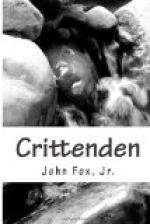And it was. Almost at that hour the troops were breaking camp and moving forward along the one narrow jungle-road—choked with wagon, pack-mule, and soldier—through a haze of dust, and, turning to the right at the first crossing beyond corps head-quarters—under Chaffee—for Caney. Now and then a piece of artillery, with its flashes of crimson, would pass through the advancing columns amid the waving of hats and a great cheering to take position against the stone fort at Caney or at El Poso, to be trained on the block-house at San Juan. And through the sunset and the dusk the columns marched, and, after night fell, the dark, silent masses of slouch hats, shoulders, and gun-muzzles kept on marching past the smoke and flare of the deserted camp-fires that lighted thicket and grassy plot along the trail. And after the flames had died down to cinders—in the same black terrible silence, the hosts were marching still.
That night a last good-by to all womankind, but wife, mother, sister, sweetheart. The world was to be a man’s world next day, and the man a coarse, dirty, sweaty, swearing, good-natured, grimly humorous, cruel, kindly soldier, feverish for a fight and as primitive in passion as a cave-dweller fighting his kind for food. The great little fight was at hand.
XI
Before dawn again—everything in war begins at dawn—and the thickets around a certain little gray stone fort alive with slouch hat, blue blouse, and Krag-Jorgensen, slipping through the brush, building no fires, and talking in low tones for fear the timorous enemy would see, or hear, and run before the American sharpshooter could get a chance to try his marksmanship; wondering, eight hours later, if the timorous enemy were ever going to run. Eastward and on a high knoll stripped of bushes, four 3.2 guns unlimbered and thrown into position against that fort and a certain little red-roofed town to the left of it. This was Caney.
Eastward still, three miles across an uneven expanse of green, jungle and jungle-road alive with men, bivouacing fearlessly around and under four more 3.2 guns planted on another high-stripped knoll—El Poso—and trained on a little pagoda-like block-house, which sat like a Christmas toy on top of a green little, steep little hill from the base of which curved an orchard-like valley back to sweeping curve of the jungle. This was San Juan.
Nature loves sudden effects in the tropics. While Chaffee fretted in valley-shadows around Caney and Lawton strode like a yellow lion past the guns on the hill and, eastward, gunner on the other hill at El Poso and soldier in the jungle below listened westward, a red light ran like a flame over the east, the tops of the mountains shot suddenly upward and it was day—flashing day, with dripping dew and birds singing and a freshness of light and air that gave way suddenly when the sun quickly pushed an arc of fire over the green shoulder of a hill and smote the soldiers over and under the low trees like rays from an open furnace.




